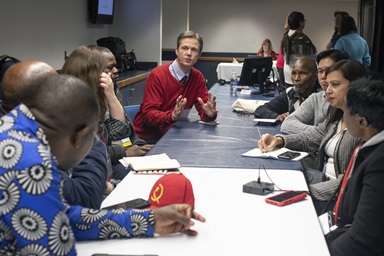In high school, Bishop Mary Ann Swenson argued against the proliferation of nuclear weapons as a student debater.
Fifty years later, Swenson, the ecumenical officer for the United Methodist Council of Bishops, still warns against the danger of nuclear war, but as vice moderator of the World Council of Churches. In early August, she will lead a WCC delegation to Japan for the 70th anniversary commemorations of the atomic bomb attacks on Hiroshima and Nagasaki during World War II.
That danger is so great, she noted, that it “really threatens the survival of humanity if (a nuclear bomb) is ever used again.”
Church leaders from eight of the 40 governments that still rely on nuclear weapons are part of the WCC pilgrimage to Japan, where they will listen to survivors, pray with local churches and reflect with other faiths on the plight of the two cities. Nine countries possess nuclear arsenals and 31 are willing to have the United States use the weapons on their behalf.
Participants will come from the United States, Germany, Japan, South Korea, Canada, Netherlands, Norway and Pakistan.
The concept of a pilgrimage for justice and peace officially was adopted at the WCC’s 10th Assembly in 2013 in Busan, Republic of Korea, said the Rev. Stephen J. Sidorak Jr., top executive of the Council of Bishops’ Office of Christian Unity and Interreligious Relationships.
“I’m absolutely convinced it (pilgrimage) has renewed the common life of the World Council of Churches and given it a new energy,” added Sidorak, a member of the WCC Commission of the Churches on International Affairs and part of the Japan delegation.
Swenson said she considers the Japan anniversary to be important and noted that the United Methodist Council of Bishops — which issued a statement on the 60th anniversary of the bombing — met in Berlin in May, 70 years since fall of that city and the end of World War II in Europe. “This is really part of our mission for justice and peace,” she added.
Making the pilgrimage
The delegation’s activities in Hiroshima on Aug. 6 — the day the city was bombed in 1945 — include the 2015 Hiroshima City Peace Memorial Ceremony; a meeting with Hibakusha, as the atomic bomb survivors are referred to in Japanese; a multi-religious symposium on nuclear disarmament and the annual lantern floating ceremony at Motomachi River Park. Similar activities, including an interreligious memorial service, are planned for Nagasaki, where the city peace ceremony is set for 10:30 a.m. local time Aug. 9.
This will be her first trip to Hiroshima, but Swenson said she has witnessed a similar lantern ceremony in Hawaii, where prayers for peace and remembrances of those who have passed are offered as the lighted lanterns float by.
Part of the idea of the pilgrimage is to “visit the wounds, places where great historical trauma has occurred and wondering what can be done to relieve that,” said Sidorak, who explained that the idea for the Japan trip was started with seed money from The United Methodist Church. “It’s been a team effort to put the funding together.”
For Sidorak, a longtime advocate for nuclear disarmament, the pilgrimage to Hiroshima and Nagasaki sparks memories of a member of a church where he served as pastor. The man had piloted the U.S. military plane assigned to document the destruction of each city after the bombs were dropped, a required duty that “literally haunted him until his death two years ago,” Sidorak said.
Being part of the 70th anniversary memorial events, he expects, will be “a very emotionally draining experience.” But the emphasis on the anniversary serves as a reminder of a danger that “hovers over humanity,” he said. With three adult children and a 6-year-old granddaughter, “I worry about nuclear war by miscalculation, accident or design. All three are real possibilities.”
Next steps
Following the pilgrimage, delegation members will urge their governments to join a new inter-governmental pledge to establish a formal ban on nuclear weapons and advocate for other steps toward deterrence.
Sidorak said United Methodists would follow up with the U.S. delegation at the United Nations and by calling attention to the Council of Bishops’ document, “God’s Renewed Creation: Call to Hope and Action,” and reminding the government “that nuclear deterrence can no longer receive the church’s blessing.”
On an international level, ecumenical efforts toward nuclear disarmament will be prioritized, he said, particularly through the WCC Commission of the Churches on International Affairs, which meets next March.
In addition to Swenson and Sidorak, the Japan delegation includes the Rev. Chang Sang, Presbyterian Church in Republic of Korea and WCC Asia President; Bishop Heinrich Bedford-Strohm, the presiding bishop of Protestant Churches in Germany; Archbishop Nathaniel Uematsu, Anglican Church in Japan; Bishop Mark MacDonald, Anglican Church in Canada and WCC North America President; Bishop Tor Jorgensen, Lutheran Church of Norway; the Rev. Karen Van Den Broeke, Protestant Church in the Netherlands and Bishop Samuel Azariah, Church of Pakistan.
Bloom is a United Methodist News Service multimedia reporter based in New York. Follow her at https://twitter.com/umcscribe or contact her at (646) 369-3759 or [email protected]
Like what you're reading? Support the ministry of UM News! Your support ensures the latest denominational news, dynamic stories and informative articles will continue to connect our global community. Make a tax-deductible donation at ResourceUMC.org/GiveUMCom.





